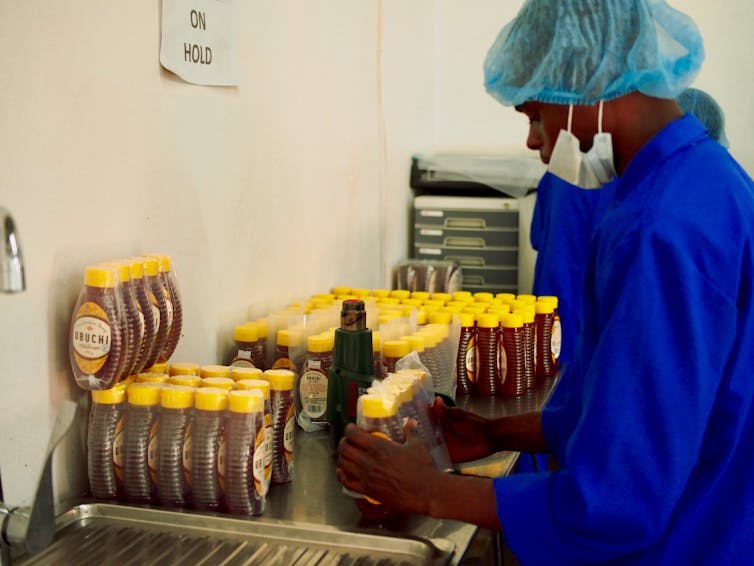Climate change is going to have huge consequences all over the world, especially in Africa. Harvests will be affected, threatening agricultural outputs. This could hurt farmers and lead to greater food insecurity.
But there hasn’t been much discussion about what effects climate change will have in other areas – like in the continent’s small and medium business sector. This is a worrying oversight.
Our research, conducted in Zambia and Botswana, revealed that businesses activities faced major disruptions during the 2015/2016 El Niño event. This was a result of drought-related water supply disruption in Botswana’s capital Gaborone, and disruption to hydroelectricity supplies in Zambia’s capital Lusaka.
El Niño is one of the key drivers of variations in global climate conditions between different years. It recurs every two to seven years and it’s typically associated with reduced rainfall and drought conditions in southern Africa.
Reflecting this trend, the 2015/2016 El Niño was one of the strongest on record. It brought widespread drought conditions and heat waves to the region.
By impacting urban water and hydroelectricity supplies, this had major consequences for business activities in Gaborone and Lusaka, as our research shows. These cities’ experiences should serve as a warning for others across the continent, and systems should be put in place to protect particularly small businesses from the worst realities of a changing climate.
Under pressure
In Botswana, as lake levels in the Gaborone Dam dropped to historical lows, businesses in Gaborone experienced decreased water pressure. In some cases businesses were completely cut off from piped water supply.
Lack of water for food preparation, butchery, irrigation, laundry, cleaning and sanitation had dire consequences for businesses such as hotels and guesthouses, restaurants, food businesses and other service industries. Hairdressers and car washing enterprises, for instance, came to a standstill as they struggled to provide services to customers or to maintain hygiene standards.
In Zambia’s capital Lusaka, where hydropower accounts for 94% of the country’s electricity generation capacity, low lake levels in Lake Kariba contributed to unprecedented electricity blackouts, often lasting for eight hours at a time.

In Lusaka, activities reliant on electricity such as manufacturing, processing and communications were interrupted as equipment was immobilised. Assets were lost because they couldn’t be reliably heated or refrigerated. In both cities, supply chains were disrupted.
Infrastructure issues
Towards the end of 2016, as El Niño drew to a close, more than half of the 135 micro, small and medium enterprises we surveyed in Gaborone and Lusaka told us their profits would be lower than previous years. Almost a third believed that their business was at risk of closing down. Business owners said disruptions to water supply and power outages, in Gaborone and Lusaka respectively, were the greatest obstacles to them doing business.
The two cities’ experiences, alongside the widely reported “Day Zero” water situation in Cape Town, South Africa, should sound a warning for businesses elsewhere on the continent. Water shortages in Cape Town began during the El Niño, but extended into 2018 as drought conditions persisted.
Read more: Day Zero is meant to cut Cape Town's water use: what is it, and is it working?
Climate change events like droughts are only going to get worse – and urban centres where many small, medium and micro enterprises thrive will be in the eye of the storm. The 2015/2016 El Niño highlighted that even fairly moderate changes in rainfall can have major consequences for businesses in African cities.
More people are moving to cities, setting up businesses and connecting, often for the first time, to water and electricity grids. This increases demand and places pressure on existing water and energy infrastructure.
At the same time, a complex set of factors has limited the development of new infrastructure and the effective management of existing resources. This means cities are struggling to keep up with the increased demand.
These factors, which include under-investment in infrastructure, policy uncertainty, governance challenges and poor municipal service provision, exacerbated the effect of drought in Botswana, Zambia and South Africa.
Preparing for a new reality
So what can be done to address these realities?
First, action is needed across sub-Saharan Africa to increase understanding of the vulnerabilities in existing water, energy and urban infrastructure – alongside the effects of increasing urbanisation and a changing climate.
And, second, small and medium sized businesses, which are key drivers of economic growth across sub-Saharan Africa and provide many people with a livelihood, need more support from governments and policy makers to help them cope with disruption.
This should include better access to information about the timing and severity of anticipated disruption to water and electricity supplies, as well as support to invest in coping strategies such as alternative sources of energy.
Patrick Curran, a policy analyst at the Grantham Research Institute on Climate Change and the Environment, also contributed to this article.![]()
Kate Elizabeth Gannon, Postdoctoral researcher, London School of Economics and Political Science and Declan Conway, Professorial Research Fellow, London School of Economics and Political Science
This article is republished from The Conversation under a Creative Commons license. Read the original article.




 Publications
Publications
 Partners
Partners





















